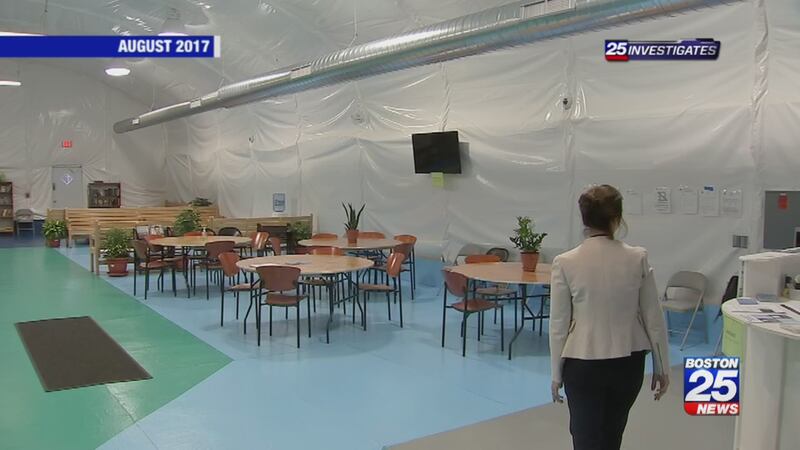BOSTON — An undercover investigation inside the City of Boston’s taxpayer-funded Engagement Center, conducted by 25 Investigates, found drugs for sale as well as people slumped over, passed out, or sleeping.
Public records show the city spent more than $1.5 million in the first year to operate the daytime drop-in center -- a large tent set up next to the Southampton Street men’s shelter in August 2017 with the goal of cleaning up Boston’s so-called Methadone Mile and giving people access to housing assistance and addiction recovery programs.
Before the tent opened last summer, 25 Investigates spent two months on the streets of Boston and found people injecting heroin and smoking crack in broad daylight on the sidewalks and patches of grass near the intersection of Massachusetts Avenue and Melnea Cass Boulevard.
>> 25 Investigates: Mayor's fence moves addiction problem across the street
Undercover Video
As investigative reporter Eric Rasmussen and photojournalist Nick Nebesny were about to go inside the tent, our camera captured the moment a man tried to sell drugs to Rasmussen. State law prohibited 25 Investigates from recording audio during the undercover investigation, but the same man followed Rasmussen inside the tent saying, “you can get anything you want.”
Cameras did record a woman slumped over on a bench, who appeared to be on the verge of passing out, and another a man struggling to stay upright. No staff members offered assistance to either person during the time 25 Investigates observed them.
“It makes us question what is really going on in the tent,” said Rev. June Cooper, executive director of City Mission Boston, an organization working to end poverty
“I really have a lot of concern about… how effective has the tent been?” asked Cooper. “It is not getting people clean and sober, it is not getting people into recovery.”
Mixed Reviews
Over the last year, many visitors to the city’s Engagement Center told 25 Investigates the tent has been a welcome alternative to the streets.
“It’s a comfortable place to chill,” said a 31-year-old self-described “addict” who gave only the name “Matty.”
He said he’s received treatment for minor injuries from nurses with Boston Health Care for the Homeless who volunteer inside the tent.
Matty also said he isn’t surprised 25 Investigates found someone trying to sell drugs inside the tent, but he says staff usually keep an eye on who comes and goes.
“They monitor you. They don't just let you come in here s**faced and high on drugs.”
Although the undercover video recorded by 25 Investigates calls that statement into question, Boston Mayor Marty Walsh insists the Engagement Center has still been effective.
“It’s working… it’s getting people off the street,” said Walsh.
“We were trying to create a space to get people literally off of the street, off of the sidewalks, off of the curbs… While they're in there, we're trying to see if we can help certain people who are willing to get into recovery, but it's keeping some of the chaos off the street.”
The city tells Boston 25 News the Engagement Center is referring an average of 28 people a week to homeless and addiction recovery programs. It reports about 32 people a week get help from an on-site nurse at the center.
While it started as a six-month pilot program, Mayor Walsh recently budgeted an additional $1.8 million to keep the tent open for another year.
“People can come in there. If they want to nod off inside, we'll let them nod off inside,” said Walsh. “You can't force people into recovery unless they're willing to go.”
“An air-conditioned warehouse”
Others who work with people struggling to overcome homelessness and addiction say the good intentions of the tent don’t go far enough.
“It’s basically an air-conditioned warehouse, as far as I’m concerned,” said Jim Stewart who runs the First Church shelter in Cambridge.
“It gets folks out of sight and in the extreme weather, of course, who's against having them off the streets? But what it does is it just concentrates them in a place where it's easier for municipalities, the state, to ignore,” said Stewart.
Over the last year, 25 Investigates found fewer people standing on the corners of Mass Ave and Melnea Cass Blvd, but our cameras also spotted more people using and selling drugs in broad daylight right outside the tent.
Since the Engagement Center opened, the Boston Public Health Commission reports EMS has responded to 130 calls of possible overdoses at the address which the tent shares with a men’s shelter.
Public records also show Boston has paid nearly $200,000 in overtime to about 60 city employees for work connected to the Engagement Center since it opened, but Mayor Walsh pushed back when asked to respond to critics who question the investment of taxpayer money.
“You can’t put a price tag on a life,” said Walsh.
Cox Media Group





